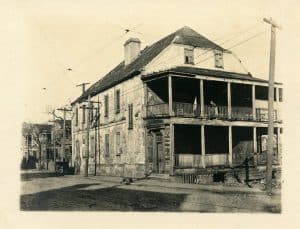Charleston History
This Month in SC History October 23, 1765: A Masked Mob Searches Henry Laurens’ House

The Henry Laurens House, at 320 East Bay Street in Charleston, was demolished in 1914. Image courtesy of The Charleston Museum
Brought to you by the South Carolina Historical Society (SCHS)
Under the guidance of Lord Grenville, the British Parliament passed the Stamp Act in March 1765. This was the first direct tax on the American colonies and was intended to reduce the debt that Great Britian had incurred during the French and Indian War. The act required that Americans pay an extra duty on all newspapers, pamphlets, legal documents, and other paper items, including playing cards. The British stipulated that the act would go into effect in November, but protests broke out in several colonies in the late summer.
In late August, citizens of Boston created effigies of British officials and hung them from an elm tree. On October 19th, several people in Charles Town demonstrated in the streets and then ransacked the house of an official who was rumored to be involved with the stamps. To keep the peace, Lieutenant Governor William Bull announced that the stamps would not be stored in town but would be kept at Fort Johnson. When rumors circulated that Bull, fearful of an attack on the fort, had moved the stamps to a home in Charleston, locals stormed and searched homes in search of them.
According to one biographer, Henry Laurens felt the act unconstitutional but objected to the unruly protests and violence of local Patriots. He appealed to Carolinians to stand “distinguished for our loyalty,” while they worked with restraint to repeal the act. When locals heard that the governor had stored the stamps in a local home, Laurens was immediately suspect. At midnight on October 23rd, Laurens heard “a most violent thumping and confused noise” at his door. When he opened the window, he observed a crowd of men in disguise. Laurens appealed to the men to leave, given that his wife was sick and pregnant. They assured him that they “loved and respected” him but were sent to search the premises. According to Laurens, the men made a “very superficial search” of his house, counting house, cellar, and stable. After that, he was forced to take an oath stating that he did not know the whereabouts of the stamps.
The day after Laurens’ home was invaded, G. Saxby and Caleb Lloyd, the local stamp Inspector and Distributor, resigned their positions. This was seen as a tremendous victory. The bells of St. Michaels peeled as a committee of citizens forced the two stamp officers to an assembly where they formally renounced their positions. Laurens, despite his objection to the act, remained supportive of orderly conduct and urged restraint. The following May, news arrived that the British repealed the act and locals celebrated for two nights. Laurens wrote that anyone (including himself, Mr. Manigault, and Mr. Beaufain) who did not join the revelry were abused.
Laurens’ biographer, David Wallace, suggests that this lack of enthusiasm for the events of 1765 were not due to a lack of patriotism. Wallace notes that Laurens “could not shout with his fellow-citizens because he saw father than they.” Laurens realized that a war would eventually come to the colonies and saw no reason for rejoicing.
























